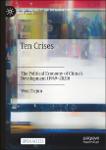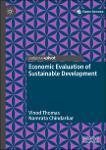Tìm kiếm
Tác giả
- Chindarkar, Namrata (1)
- Thomas, Vinod (1)
- Tiejun, Wen (1)
- Yano, Makoto (1)
- Sau >
Chủ đề
- Asia (1)
- Asian Economics (1)
- Bubble Economy (1)
- China (1)
- Sau >
Năm xuất bản
Toàn văn
- true (3)
Kết quả tìm kiếm
This open access book provides an in-depth examination of Japan's policy responses to the economic challenges of the 1980s and '90s. While MITI's earlier role in promoting rapid growth has been addressed in other studies, this volume, based on official records and exhaustive interviews, is the first to examine the aftermath of rapid growth and the evolution of MITI's interpretation of the economy's changing needs. Covering such topics as the oil shocks, trade conflict with the United States, and the rise and collapse of the so-called bubble economy, it presents a detailed analysis and evaluation of how these challenges were interpreted by government officials, the kinds of policies that were enacted, the extent to which policy aims were realized, and lessons for the longer term. Thi... |
This open access handbook, Ten Crises systematically traces the economic history
of China from 1949 to 2020, unravelling the complex domestic and global factors
leading to the cyclical crises identified by WEN and his research team, and
examining the corresponding counteracting policies and measures by the
government to resolve or defer the crises. The book offers profound insights into
China’s endeavours and predicaments on the path of modernization, and
contemplates opportunities and lessons for the forging of alternative trajectories
not only for China but also for the global south: to reconstruct rural communities
for integrated cooperation and governance, and to revitalize ecological civilization. |
This book presents methods to evaluate sustainable development using economic tools. The focus on sustainable development takes the reader beyond economic growth to encompass inclusion, environmental stewardship and good governance.
Sustainable Development Goals (SDGs) provide a framework for outcomes. In illustrating the SDGs, the book employs three evaluation approaches: impact evaluation, cost-benefit analysis and objectives-based evaluation.
The innovation lies in connecting evaluation tools with economics. Inclusion, environmental care and good governance, thought of as “wicked problems”, are given centre stage. The book uses case studies to show the application of evaluation tools. It offers guidance to evaluation practitioners, students of development and policymaker... |



